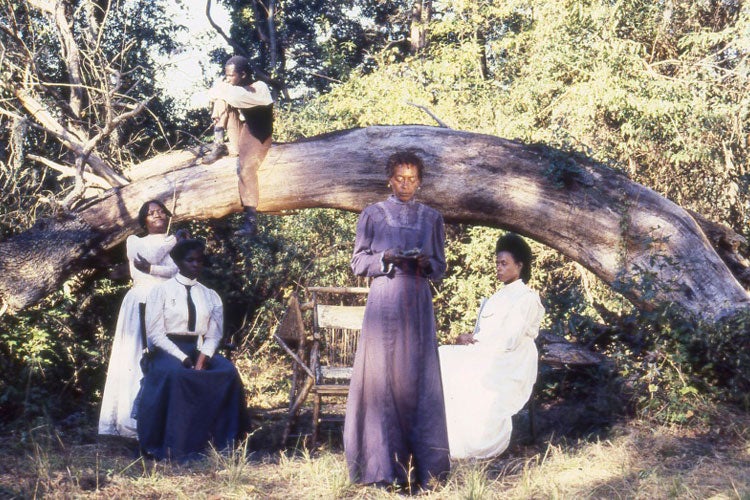You are here
Daughters of the Dust

Julie Dash’s 1991 masterpiece was her first feature, and the first American feature directed by an African American woman to receive a general theatrical release. It announced a formidable talent, and in the grandeur and intricacy of its formal construction and themes, powerfully emblematized its director’s purposeful commitment to cinema.
Abounding with surprise, the film transports us to a little-known setting to unfold a universal tale. The year is 1902, in the home of an extended family off the coast of South Carolina and Georgia where they maintain strong connections to African linguistic and cultural traditions. Here, many members of the Peazant family are on the verge of a planned migration to the U.S. mainland, where American modernity seems, vaguely, to offer a better life.
However, family members clash over the meaning of this move. Viola, who has lived up North and returned as a Christian convert, views the crossing as a step out of bankrupt African superstitions into a kind of light. Scandal-tinged “Yellow Mary,” returning to the family from a long self-exile, still asserts her independence but fears losing the touchstone of home. Nana Peazant, the aged matriarch, refuses to migrate and frets over the possibility of broken family ties and lost traditions. Eulah, young and with child, fears that the family’s plan represents a futile flight from intractable legacies of pain.
A brilliant cast enacts these negotiations with exceeding depth, befitting the weight of the decision the Peazants face: to embrace the land that other Africans once fled. Dash constructs their home as a rarefied world, possibly soon a “paradise lost,” through a masterful interplay of mise-en-scène, symbolic markers and magical realist gestures. All of this is graced by the luminous cinematography of A. Jaffa Fielder and John Barnes’ stunningly original score. Named to the National Film Registry in 2004 by the Library of Congress, Daughters of the Dust eloquently frames concerns that have preoccupied many independent filmmakers of Dash’s generation: the place of family and tradition in ameliorating historical wrongs, the hope of spiritual escape from a history of trauma, and the elusive possibility of finding deliverance together.
—Shannon Kelley
New, fully timed second answer print struck from original 35mm color internegative. Laboratory services provided by Janice Allen, Cinema Arts, Inc.
Film Credits
| Individual | Role(s) |
|---|---|
| Julie Dash |
Director Producer Writer |
| A. Jaffa Fielder | Cinematographer |
| Amy Carey | Editor |
| Joseph Burton | Editor |
| Cora Lee Day | Cast |
| Alva Rogers | Cast |
| Barbara O. Jones | Cast |
| Adisa Anderson | Cast |
| Kaycee Moore | Cast |
| Cheryl Lynn Bruce | Cast |
| Tommy Hicks | Cast |
To report problems, broken links, or comment on the website, please contact support
Copyright © 2025 UCLA Film & Television Archive. All Rights Reserved






 Mobile Navigation
Mobile Navigation

